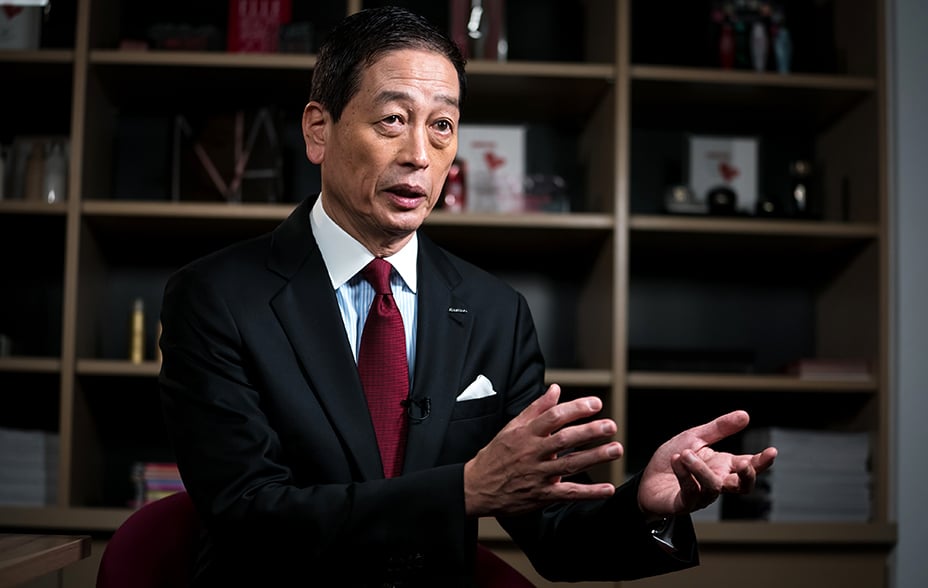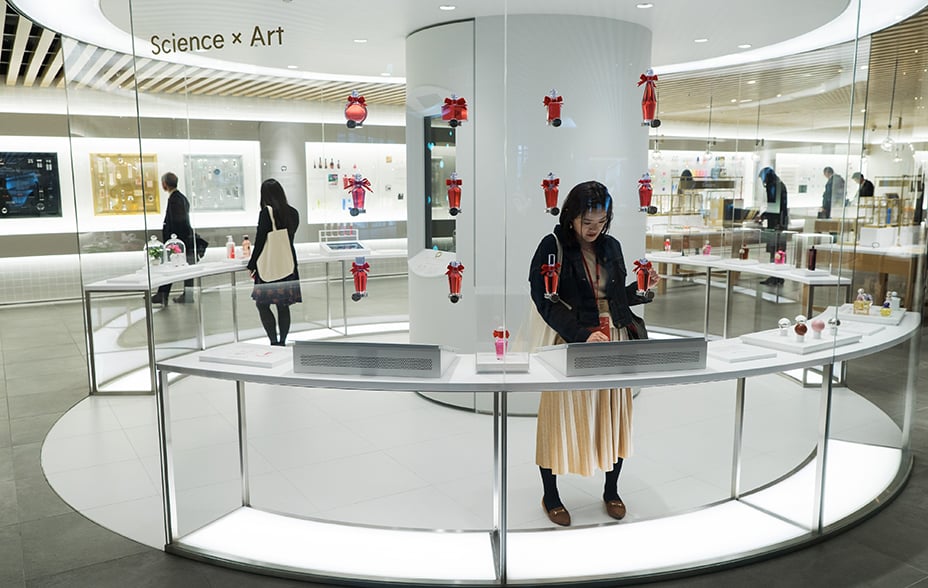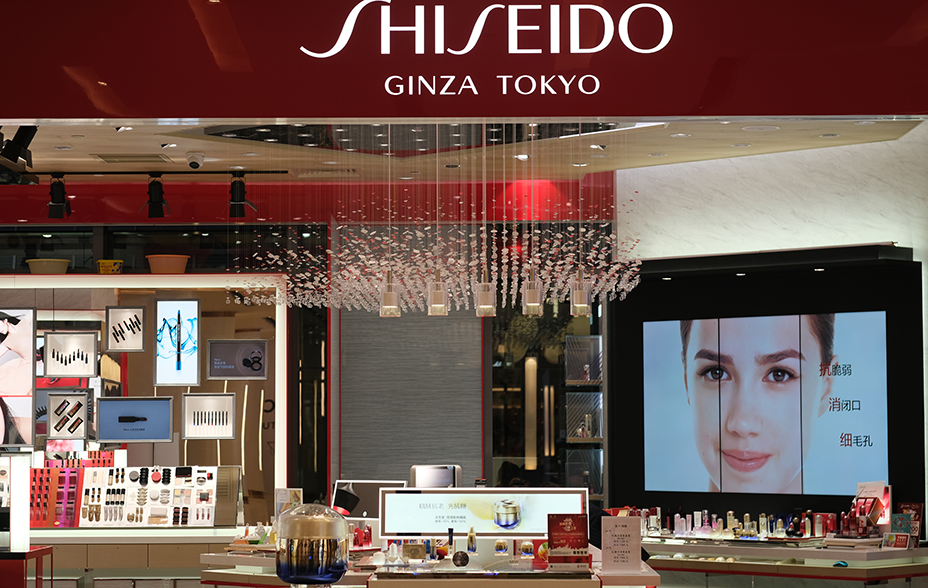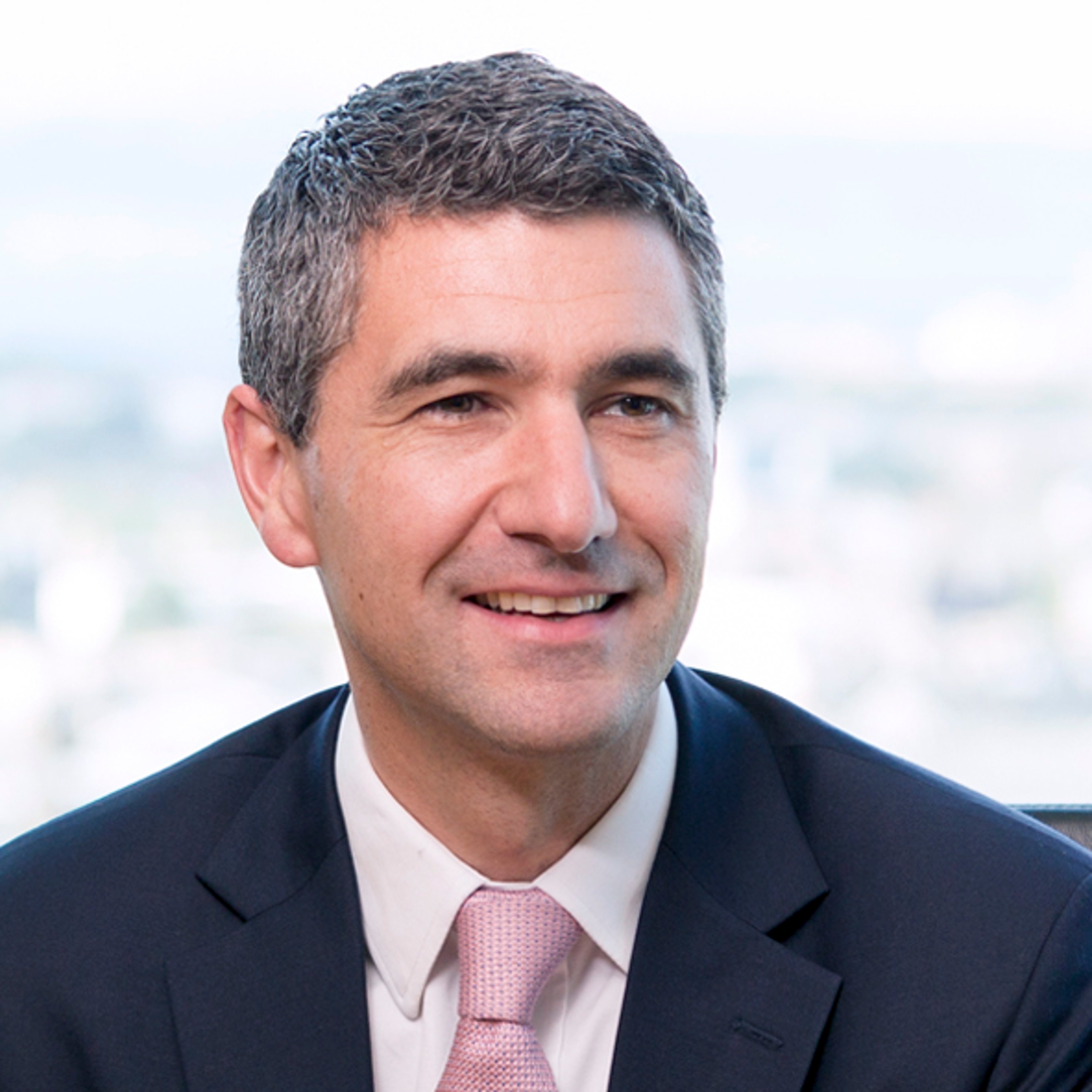
All investment strategies have the potential for profit and loss, capital is at risk. Past performance is not a guide to future returns.
No one was more surprised than Masahiko Uotani, former CEO of Coca-Cola Japan, when in 2014 Shiseido invited him to head one of Japan’s most traditional companies. The cosmetics conglomerate had never looked outside the company for leaders in its 150-year history.
Shiseido, whose 32 brands include Elixir, Clé de Peau Beauté and Drunk Elephant, was struggling to grow. Marketing specialist Uotani-san was tasked with boosting its appeal and turning around its fortunes.
Since then he has helped transform Shiseido into a global brand, appealing to a new generation with its emphasis on whole-body health and wellbeing, finding new ways to enhance the prestige of its luxury brands.
In London, for Baillie Gifford’s November 2022 Japan Forum ‘Unlocking Japan’s Upside’, Uotani-san sat down for a ‘fireside chat’ with investment manager Iain Campbell to discuss the renaissance of a Japanese icon.
Iain Campbell: What was your reaction to being asked to be CEO of Shiseido?
Masahiko Uotani: I thought that a company as traditional as Shiseido hiring an outsider for the first time was a big symbol of change in Japan.
I knew it wasn’t going to be easy, but I felt Shiseido could become more global to be more successful and could act as a showcase to other Japanese companies. That was what motivated me to take the risk. I made it my mission to make Shiseido a truly global company, not just in terms of its sales outside Japan, but with a more international business culture, employing talented people from other parts of the world. Shiseido has been around for nearly 150 years. My role was to ensure it could last for another 150.
IC: You were open from the start about the scale of the challenge, and that a lot of investment would be needed. How did the market react?
MU: The first investor I met was in the US. He said "Uotani-san, we’ve been betrayed by Shiseido for years. We’ve been waiting for someone like you to change it overnight. I expect you to reduce headcount by 30 per cent tomorrow.”
I replied “If that's what shareholders expect, I'm the wrong guy. I'll do everything I can, but it will take time.”
I discussed with my management team how, after struggling with $6bn revenue and a 3 per cent operating margin, we should set an objective of $10bn revenue and a 10 per cent margin by 2020. Their initial concern was that if we try to do that and fail, we would embarrass ourselves. Then they said, OK, this can be an aspiration but we're not going to make an announcement. I announced it. That pushed us into a corner!
It took us three years to clean up the biggest issues. First, we invested in brand innovation and talented people from around the world. Then we accelerated sales growth, and with time we had more money to invest. After seven years of almost no growth, everybody could see the change. We were able to achieve our $10bn revenue and 10 per cent margin targets well in advance.

IC: The turnaround was as much about innovation as cost cutting. There’s a lot of science in cosmetics. How do you stay ahead of that?
MU: I refused to cut investment in skin research and, along with our longstanding partnership with Harvard Medical School, we’re working with other medical and healthcare companies on how skin relates to the health of the whole person. It’s a more holistic view of beauty.
When I joined, research and development (R&D) investment for product development was only 1.8 per cent of total sales, I increased it to 3 per cent and increased the number of researchers from 1000 to 1500.
I also increased localisation. People are different by region and by country. Although we set out to be a global company, localization is really important. We invested $400m in a new Global Innovation Centre in Yokohama while expanding innovation hubs in Paris, Shanghai, New Jersey, and Singapore which work closely with local universities to understand differences in skin types.
IC: China is very important to your future. Is it experiencing the same high-quality skincare trend as Europe and can Shiseido meet that demand?
MU: Chinese and Japanese are from the same Asian tribe, and Shiseido’s knowledge and technology are reasons Chinese consumers identify with our brand. When they could travel to Japan, we had the highest share of Chinese inbound demand. It’s a struggle now because of Covid but China is becoming the world’s largest beauty market, set to exceed the US, as obviously the population is four times bigger. We see that market growing for us, and the next important phase for us will be India and the ASEAN countries, especially Vietnam. We benefit from a strong ‘look-to-Japan’ dynamic.
IC: Could tensions between Japan and China potentially affect your business?
MU: In a consumer business, all that’s needed is for people to connect with our brands. Whatever happens in politics, we’ve got to develop these interconnections.
Even in recent phases of US-China tension, the American brand Estée Lauder did good business in China. Business is business. Consumers are free to choose their brand and many Chinese are loyal to ours.
IC: Why was it so important for you to take more advantage of the travel market?
MU: Travel retail is growing. There are 1.2 billion people travelling internationally every year and that’s growing by 4 per cent a year, so 15 million new travellers are generated every year. Big airports are being built, offering entertainment, eating and shopping experiences. When I joined Shiseido I asked why we weren’t more aggressively developing the travel retail business. Our share of this was less than $200m back in 2014. Talking to one of the big retailers in Hong Kong I found that our share there was only 1.25 per cent whereas another competitor had 10 per cent. But they were only 1.5 times bigger in terms of total company size not eight times bigger, so we were completely underdeveloped. We hired an experienced person from a global French cosmetics company to head this division and moved its headquarters from Paris to Singapore where we hired local travel retail experts. The travel operation became a $1bn business within six years. Obviously, Covid has suspended that, but when we get back to normal, I think we can achieve a $2bn business by 2027.

IC: It’s astonishing that all you had to do was notice the pent-up demand and get the right person in place.
MU: There was an adverse Japanese way of thinking at work here which we had to change. When I asked why we weren’t proactively going after that terminal business like our competitors I was told ‘well we have traditional Japanese customers and they don't like it’. But had they talked to consumers? Because when they’re travelling around, they feel and behave differently, and often want to buy a souvenir or a gift. And once we created more opportunities for consumers to buy in the airports, when they go back home they become loyal users of our brand.
IC: Shiseido's board scores highly for gender diversity. Why is this important to you?
MU: Just as customers are changing and suddenly don’t want exactly the same brands and products as others, we felt our own thinking needed to be more diverse. When the Japanese economy was booming in the 1970s and 80s, everybody had to be on the same page. Japanese workers were dedicated, diligent and unquestioning. That gave Shiseido a cost advantage and also a quality advantage, and it’s the basis for our success now.
I’m used to working with women, so it was natural to promote a more diverse team at Shiseido. This would seem natural for a cosmetics company, but when I joined, we only had only one female in the management team. I changed that and now 46 per cent of board members are female.
We also have diversity in nationality. Japanese companies need different types of people. My experience at Coca-Cola gave me confidence about this. When I was CEO there I had six different nationalities reporting to me. It meant management meetings usually lasted longer than you’d expect in a Japanese company.
IC: How about the use of English?
MU: If you’re trying to get talented people of different nationalities to work together, lack of English is a big disadvantage. In 2018 I worked to make English the common language at Shiseido headquarters. All our management meetings would be done in English, presentations should be in English. I provided free training to 3,000 people, free for two years, investing over $50m a year. When people said in excellent English: 'I'm not good at English and therefore I’ll speak Japanese', I told them to be more courageous.
IC: Shouldn’t we also recognise the many strengths of traditional Japanese business DNA?
MU: Japanese companies are strong in people and technology – you’ll see that if you visit our plants. The standards of cleanliness reflect the contribution of workers to the high quality of the products. But an area of weakness in Japan is marketing, communication to global markets, and branding in the consumer areas, particularly in the food and beverage, cosmetics, toiletry and personal care categories. Now Shiseido has become a more valuable brand, the 34th in the world, according to Euromonitor Research. I'm not just expressing pride about this, I'm telling other Japanese CEOs about the huge untapped opportunities that come from getting out there and going global using your own assets. We have to communicate better.
Risk factors
The views expressed should not be considered as advice or a recommendation to buy, sell or hold a particular investment. They reflect opinion and should not be taken as statements of fact nor should any reliance be placed on them when making investment decisions.
This communication was produced and approved in January 2023 and has not been updated subsequently. It represents views held at the time of writing and may not reflect current thinking.
This communication contains information on investments which does not constitute independent research. Accordingly, it is not subject to the protections afforded to independent research, but is classified as advertising under Art 68 of the Financial Services Act (‘FinSA’) and Baillie Gifford and its staff may have dealt in the investments concerned.
All information is sourced from Baillie Gifford & Co and is current unless otherwise stated.
The images used in this communication are for illustrative purposes only.
Important information
Baillie Gifford & Co and Baillie Gifford & Co Limited are authorised and regulated by the Financial Conduct Authority (FCA). Baillie Gifford & Co Limited is an Authorised Corporate Director of OEICs.
Baillie Gifford Overseas Limited provides investment management and advisory services to non-UK Professional/Institutional clients only. Baillie Gifford Overseas Limited is wholly owned by Baillie Gifford & Co. Baillie Gifford & Co and Baillie Gifford Overseas Limited are authorised and regulated by the FCA in the UK.
Persons resident or domiciled outside the UK should consult with their professional advisers as to whether they require any governmental or other consents in order to enable them to invest, and with their tax advisers for advice relevant to their own particular circumstances.
Financial Intermediaries
This communication is suitable for use of financial intermediaries. Financial intermediaries are solely responsible for any further distribution and Baillie Gifford takes no responsibility for the reliance on this document by any other person who did not receive this document directly from Baillie Gifford.
Europe
Baillie Gifford Investment Management (Europe) Limited provides investment management and advisory services to European (excluding UK) clients. It was incorporated in Ireland in May 2018. Baillie Gifford Investment Management (Europe) Limited is authorised by the Central Bank of Ireland as an AIFM under the AIFM Regulations and as a UCITS management company under the UCITS Regulation. Baillie Gifford Investment Management (Europe) Limited is also authorised in accordance with Regulation 7 of the AIFM Regulations, to provide management of portfolios of investments, including Individual Portfolio Management (‘IPM’) and Non-Core Services. Baillie Gifford Investment Management (Europe) Limited has been appointed as UCITS management company to the following UCITS umbrella company; Baillie Gifford Worldwide Funds plc. Through passporting it has established Baillie Gifford Investment Management (Europe) Limited (Frankfurt Branch) to market its investment management and advisory services and distribute Baillie Gifford Worldwide Funds plc in Germany. Similarly, it has established Baillie Gifford Investment Management (Europe) Limited (Amsterdam Branch) to market its investment management and advisory services and distribute Baillie Gifford Worldwide Funds plc in The Netherlands. Baillie Gifford Investment Management (Europe) Limited also has a representative office in Zurich, Switzerland pursuant to Art. 58 of the Federal Act on Financial Institutions (‘FinIA’). The representative office is authorised by the Swiss Financial Market Supervisory Authority (FINMA). The representative office does not constitute a branch and therefore does not have authority to commit Baillie Gifford Investment Management (Europe) Limited. Baillie Gifford Investment Management (Europe) Limited is a wholly owned subsidiary of Baillie Gifford Overseas Limited, which is wholly owned by Baillie Gifford & Co. Baillie Gifford Overseas Limited and Baillie Gifford & Co are authorised and regulated in the UK by the Financial Conduct Authority.
China
Baillie Gifford Investment Management (Shanghai) Limited 柏基投资管理(上海)有限公司(‘BGIMS’) is wholly owned by Baillie Gifford Overseas Limited and may provide investment research to the Baillie Gifford Group pursuant to applicable laws. BGIMS is incorporated in Shanghai in the People’s Republic of China (‘PRC’) as a wholly foreign-owned limited liability company with a unified social credit code of 91310000MA1FL6KQ30. BGIMS is a registered Private Fund Manager with the Asset Management Association of China (‘AMAC’) and manages private security investment fund in the PRC, with a registration code of P1071226.
Baillie Gifford Overseas Investment Fund Management (Shanghai) Limited
柏基海外投资基金管理(上海)有限公司(‘BGQS’) is a wholly owned subsidiary of BGIMS incorporated in Shanghai as a limited liability company with its unified social credit code of 91310000MA1FL7JFXQ. BGQS is a registered Private Fund Manager with AMAC with a registration code of P1071708. BGQS has been approved by Shanghai Municipal Financial Regulatory Bureau for the Qualified Domestic Limited Partners (QDLP) Pilot Program, under which it may raise funds from PRC investors for making overseas investments.
Hong Kong
Baillie Gifford Asia (Hong Kong) Limited 柏基亞洲(香港)有限公司 is wholly owned by Baillie Gifford Overseas Limited and holds a Type 1 and a Type 2 license from the Securities & Futures Commission of Hong Kong to market and distribute Baillie Gifford’s range of collective investment schemes to professional investors in Hong Kong. Baillie Gifford Asia (Hong Kong) Limited 柏基亞洲(香港)有限公司 can be contacted at Suites 2713–2715, Two International Finance Centre, 8 Finance Street, Central, Hong Kong. Telephone +852 3756 5700.
South Korea
Baillie Gifford Overseas Limited is licensed with the Financial Services Commission in South Korea as a cross border Discretionary Investment Manager and Non-discretionary Investment Adviser.
Japan
Mitsubishi UFJ Baillie Gifford Asset Management Limited (‘MUBGAM’) is a joint venture company between Mitsubishi UFJ Trust & Banking Corporation and Baillie Gifford Overseas Limited. MUBGAM is authorised and regulated by the Financial Conduct Authority.
Australia
Baillie Gifford Overseas Limited (ARBN 118 567 178) is registered as a foreign company under the Corporations Act 2001 (Cth) and holds Foreign Australian Financial Services Licence No 528911. This material is provided to you on the basis that you are a ‘wholesale client’ within the meaning of section 761G of the Corporations Act 2001 (Cth) (‘Corporations Act’). Please advise Baillie Gifford Overseas Limited immediately if you are not a wholesale client. In no circumstances may this material be made available to a ‘retail client’ within the meaning of section 761G of the Corporations Act.
This material contains general information only. It does not take into account any person’s objectives, financial situation or needs.
South Africa
Baillie Gifford Overseas Limited is registered as a Foreign Financial Services Provider with the Financial Sector Conduct Authority in South Africa.
North America
Baillie Gifford International LLC is wholly owned by Baillie Gifford Overseas Limited; it was formed in Delaware in 2005 and is registered with the SEC. It is the legal entity through which Baillie Gifford Overseas Limited provides client service and marketing functions in North America. Baillie Gifford Overseas Limited is registered with the SEC in the United States of America.
The Manager is not resident in Canada, its head office and principal place of business is in Edinburgh, Scotland. Baillie Gifford Overseas Limited is regulated in Canada as a portfolio manager and exempt market dealer with the Ontario Securities Commission ('OSC'). Its portfolio manager licence is currently passported into Alberta, Quebec, Saskatchewan, Manitoba and Newfoundland & Labrador whereas the exempt market dealer licence is passported across all Canadian provinces and territories. Baillie Gifford International LLC is regulated by the OSC as an exempt market and its licence is passported across all Canadian provinces and territories. Baillie Gifford Investment Management (Europe) Limited (‘BGE’) relies on the International Investment Fund Manager Exemption in the provinces of Ontario and Quebec.
Israel
Baillie Gifford Overseas is not licensed under Israel’s Regulation of Investment Advising, Investment Marketing and Portfolio Management Law, 5755–1995 (the Advice Law) and does not carry insurance pursuant to the Advice Law. This material is only intended for those categories of Israeli residents who are qualified clients listed on the First Addendum to the Advice Law.
Ref: 29070 10017448




